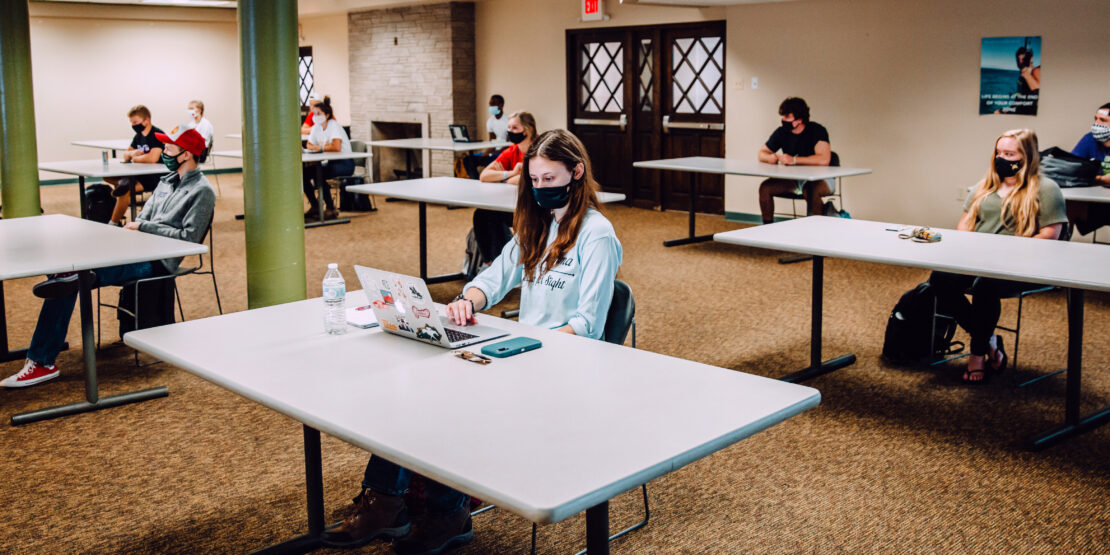In a year that has produced unprecedented experiences and events due to COVID-19, there was no doubt that the return to living and attending in-person classes on the William Woods campus was going to be a time like no other in the University’s 150-year history. Attending classes, being active on campus, participating in LEAD events, eating in the dining hall – all normal parts of the WWU experience – were going to be altered by life during the pandemic.
Returning to campus with in-person classes has been the goal since COVID-19 devastated the campus in March. Last week, with that return finally realized after months of preparation, members of the campus community were focused on maintaining safety measures and finding creative ways to achieve the next goal of staying on campus until late November.
Beginning a New Chapter in Returning to Campus
Since everyone has been out of the classroom for five months, both professors and students were thrilled to see each other again when classes began August 17th. That included English professor Dr. Stephanie Wells, who was excited to prepare to see her students again face to face.
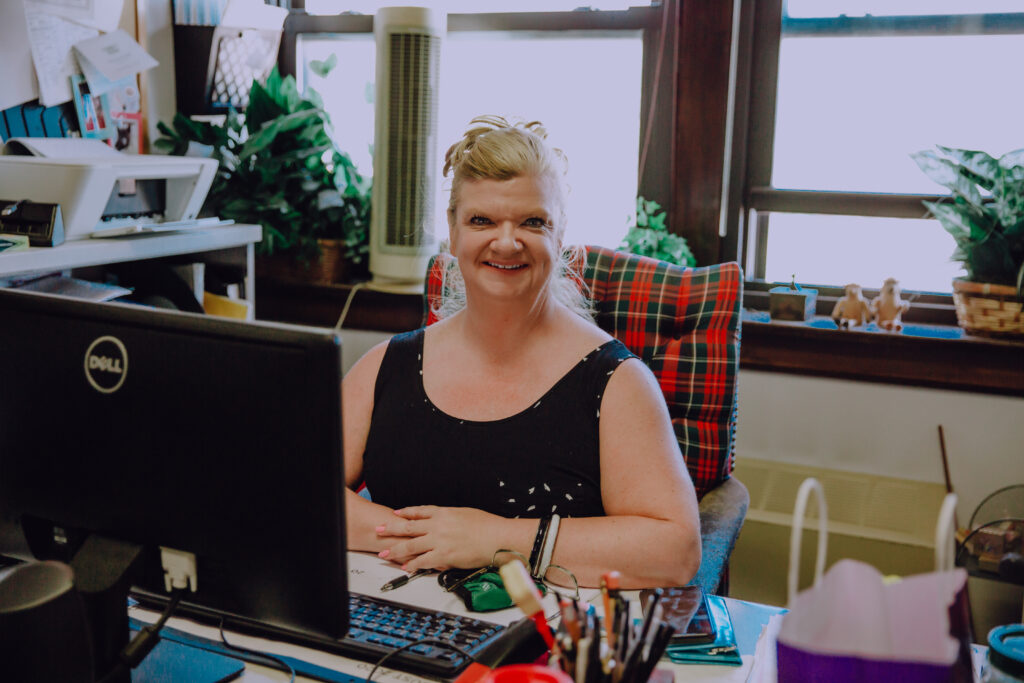
“That part was rewarding for me, but I understand that we must keep safety at the forefront of our plans,” Wells said.
Moving through the first week of classes was smoother than Wells anticipated. She explained that while students are happy to be in the classroom, they also understand the need to limit contact to ensure in-person classes can continue.
Flexibility will be as important as safety. Although apprehensive when she first learned that she would be teaching in the Ivy Room, Wells soon learned the Ivy Room had been converted into an effective and accommodating learning space.
“Before classes began, I visited the room, and I was impressed by the technology updates, the spacing of student seating, and the overall atmosphere of the room,” Wells said. “I wrote an email to the Academic Dean, Dr. Aimee Sapp, that afternoon sharing my positive response to where I would be teaching.”
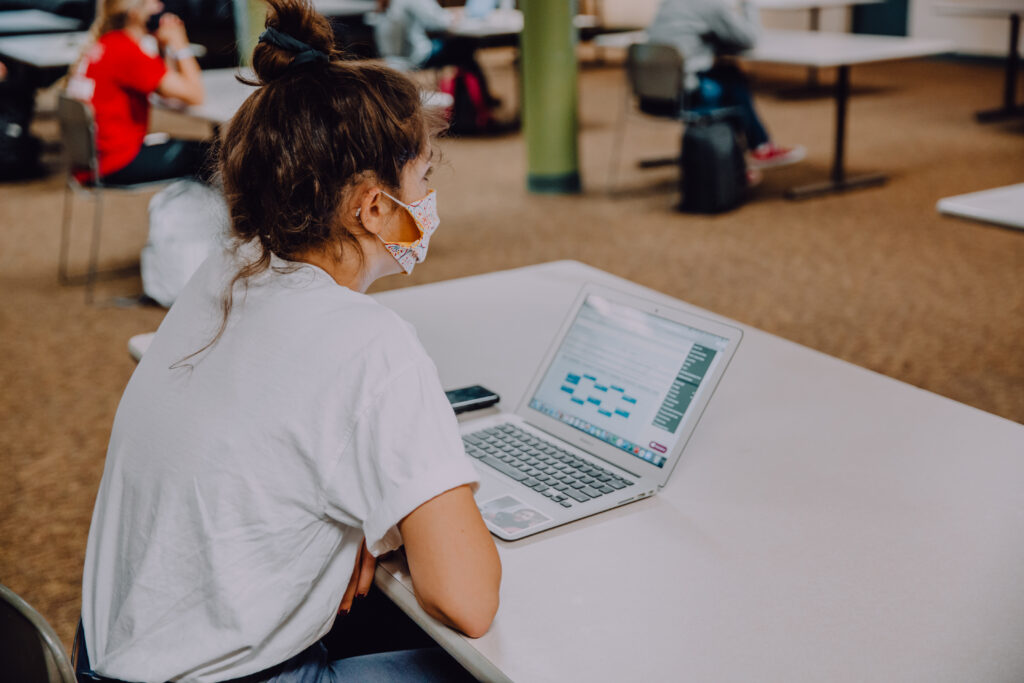
The juggling of classrooms and teaching times, all with the goal of maintaining physical distancing, has been one of the biggest challenges among many during this highly unusual fall semester.
“That has been what has taken the most preparation and brain power – scheduling physically-distanced classes,” said Dr. Sapp. “We wanted to make sure that students could be at an appropriate distance when seated in class. And with safety being the first concern, we had to move some classes to much bigger spaces. It was an interesting problem to solve but we have had a great team working on it and I am very pleased with the results.”
“I want to be on campus,” Wells said. “Though I cannot be close to people, it gives me hope to look out my office window and see life going on or to look up and see someone standing in my door with their mask on just to say hello.”
It All Adds Up
Another professor excited to return is Professor of Mathematics, Raymond Hune, whose main task has been focusing on making coursework formatted in Owlnet for students to complete both in-seat and virtually. The classrooms have received more integration of technology into instruction for the in-seat and virtual learners as an ongoing endeavor.
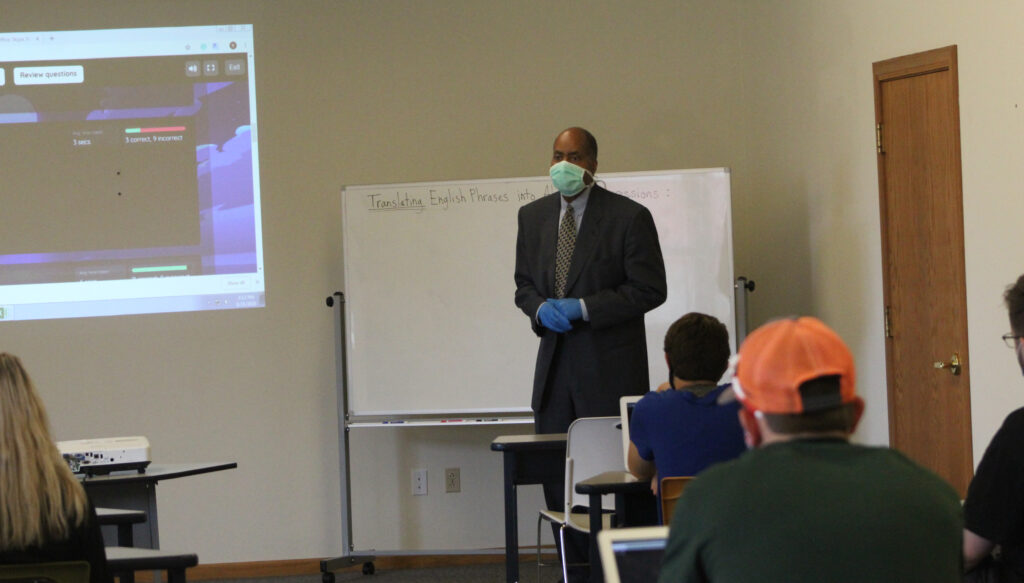
“The first few days of the semester have presented a renewed level of excitement,” said Hune. “Even with all the COVID-19 precautions in place, the students and faculty appear to be happy about their return to campus and in-seat educational opportunities.”
The library where Hune teaches was chosen as a classroom because it met the requirements of a mid-size class space, defined as one that accommodates 15-18 students.
“Teaching in the library is fine when compared to other places I’ve taught in, such as a janitor’s closet,” Hune said. “Through the various learning experiences, one learns that the “how” you teach is more easily adaptable and important than the “where”.
Collaboration is key during this time to ensure that classes go smoothly and Hune found students very cooperative during the first week of class, focusing on academics and safety at the same time.
“Every student has kept their masks on in class, completed their first homework assignment, and has arrived to class on time,” he said. “I am hopeful about the semester ahead, regardless of the different environment.”
Teaching Non-traditional Classes
The first couple of days were somewhat hectic because three of the four rooms were new spaces for Assistant Professor of Sports Management Doug Sanders.
“Trying to get there a week or two before we started to make sure the tech worked was my goal,” Sanders said. “There was also additional details to attend to, such as communicating with all the students to make sure if they had to be off-site that they knew what was needed to be done.”
Professors like Sanders had the option to have group pod rotations, where a group would meet in class one day and virtual the next, while another group flipped the same experience. Instead Sanders decided to move to a space that is not normally a classroom but one that made it possible for all to be present. One of those non-traditional spaces, for example, was the auditorium in the McNutt Campus Center. This is the second time Sanders has taught in a large theater and he enjoys the movie-sized screen.
“This semester is a learning process and pretty much a first for everyone,” Sanders said. “We are all making do and doing their best.”
For office hours, Sanders borrowed a yard stick from his neighbor’s office and moved the furniture away from his desk a bit more, to enhance physical distancing. His monitor can be turned so that if there’s visual aids needed, it’s accessible, so not too much will be different for Sanders other than students may want to virtually chat or email more.
“I think there’s value in using office hours for students to get to know the personality of the faculty members,” Sanders said. “Most have mementos or trinkets that let students see more about who faculty are outside of the classroom – email and ZOOM don’t allow for that as much.”
For this semester, all of Sanders’ online students are in morning classes, so the time differences don’t go far into the night or overnight like they did during spring semester for his international students.
“As a result, I hope to be able to have all of us be live as much as possible as long as the technology allows,” Sanders said. “If we run into problems, then we’ll definitely have to have the virtual students be a lot more engaged with one another to mirror the in-class experience and interaction the in-seat students are able to have.”
Leading the Way
Returning to campus was a mixed bag for Palmer Soberg ’23, as he, like other campus leaders wants to help ensure students have a successful year with events in and outside of the classroom. He is looking forward to the coming year, despite a campus experience that now includes masks, physically-distanced classrooms, and social interactions limited due to the virus.
“I was extremely excited to come back to everyone but knew it wouldn’t be the same as it was,” Soberg said. “Nonetheless, this is what we all have been wanting – to be back on campus, attending classes in-person and having as close to normal of an experience as possible.”
To start the school year, Soberg came up with a virtual gaming idea for students to play following orientation as well as to earn one of their first LEAD event points of the year.
He came up with the event when he realized that the University wouldn’t be able to have in- person events like usual, and statistically most people like to play games of some kind (not to mention interact with their classmates and friends). So it was just a matter of figuring out what everyone would play.
“The people who attended loved the event and it was rather laid back as well,” Soberg said. “I know the incoming students were being rushed around all day so I’m sure they appreciated the break.”
The event was led by Soberg and the Campus Activities Board. The group is meeting soon to decide what this semester’s LEAD events will look like but so far they have talked about watch parties, ZOOM speakers, outdoor events, and other activities that can be held safely.
“Although this semester is going to be hard on all of us with the restrictions put in place, I know that it will be a fun one and just hope we all make the most out of it,” Soberg said. “We go through a lot together in our time here and this is just another hurdle we will get over together.”
An Innovative New Dining Experience at Tucker
“The biggest goal for Tucker Dining Hall in the age of COVID-19 will always be to provide a safe dining environment for the students,” said Charles Rehm, Director of Dining Services. “That includes providing as many meal options for the students as before, using new technology to make the dining experience safer.”
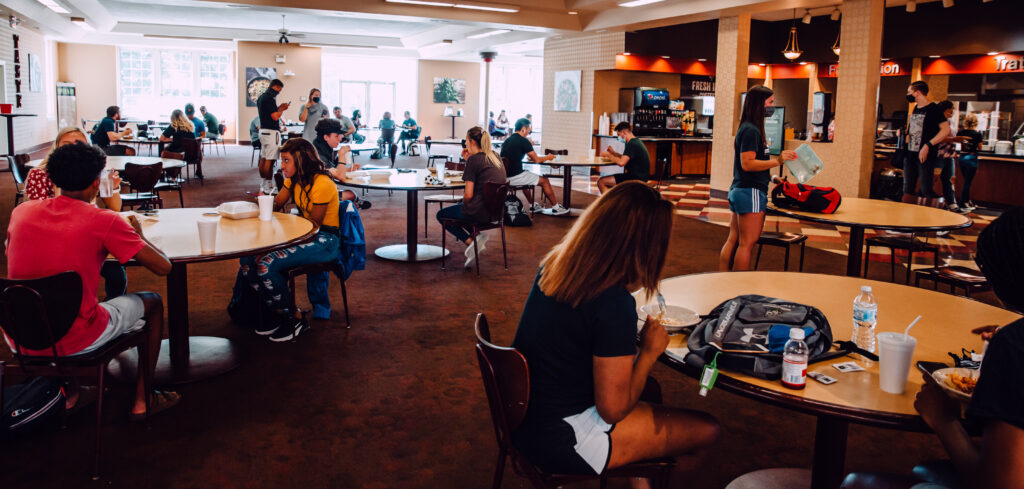
This fall, there are now two stations at the salad and pasta bars at Tucker where guests can order their meals through an app on their phones, receiving a text when their order is ready to be picked up.
Elizabeth Kasubke ‘21 has enjoyed the new process of dining at Tucker.
“Tucker has been better than ever, and it’s good to know they are taking all the safety precautions they are,” Kasubke said. “They make fresh salads and really good wraps, and it feels somewhat normal.”
Grace Mauzy ’24 has also enjoyed Tucker. She believes that placing orders ahead makes it easy and convenient when going between classes, while making the experience as safe as possible.
“The food is really good too because you can customize it to how you like it,” she said.
Fresh Perspective of Returning to Campus
Mauzy’s freshman year has been a double adjustment – starting college as a freshman, in the midst of a global pandemic. With COVID, learning to navigate a college class schedule for the first time has made things even more hectic for her than normal, with some of her classes in person one day, and then online the next.
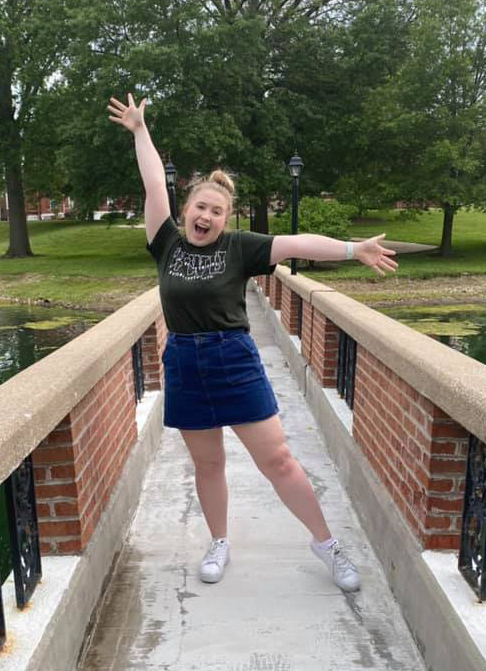
“Wearing masks and trying to social distance as much as possible has been difficult, but I have been holding myself accountable,” Mauzy said. “I’ve learned a lot about time management with these changes. My freshman experience so far has been amazing and I wouldn’t trade it for the world.”
Who knows how much William Woods, or the world as a whole, will change between now and when Mauzy graduates in 2024. But the campus has already had to deal with enough change and disruption in the past five months to last a lifetime and will be well-served by the experience. For now, the energy and activity of a fall semester at William Woods have returned, and whatever the future holds, this campus community will be ready.

